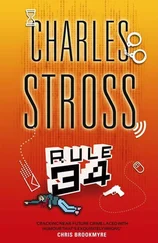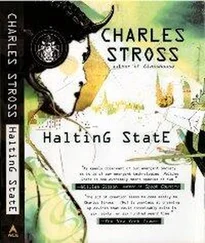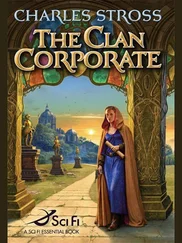Centris Magna had been good in some ways: they had a much bigger apartment than back home, and there was lots of stuff happening. Lots of people her age, too. But there were bad things, too, and if anyone had asked Wednesday, she’d have told them that they outweighed the good by an order of magnitude. Not that anyone had actually asked her if she wanted to be subjected to the bizarre cultural ritual known as “schooling,” locked up for half her waking hours in an institution populated by imbeciles, sadistic sociopaths, bullies, and howling maniacs, with another three years to go before the Authorities would let her out. Especially because at fifteen in Moscow system she’d been within two years of adulthood — but in Septagon, you didn’t even get out of high school until you were twenty-two.
Centris Magna was part of the Septagon system, a loosely coupled cluster of brown dwarf stars with no habitable planets, settled centuries ago. It was probably the Eschaton’s heavy-handed idea of a joke: a group called the space settlers’ society had found themselves the sole proprietors of a frigid, barely terraformed asteroid, with a year’s supply of oxygen and some heavy engineering equipment for company. After about a century of bloodshed and the eventual suppression of the last libertarian fanatics, the Septagon orbitals had gravitated toward the free-est form of civilization that was possible in such a hostile environment: which meant intensive schooling, conscript service in the environmental maintenance crews, and zero tolerance for anyone who thought that hanging separately was better than hanging together. Wednesday, who had been one of the very few children growing up on a peripheral station supported by a planet with a stable biosphere, was not used to school, or defending the atmospheric commons, or to being expected to fit in. Especially because the education authorities had taken one look at her, pigeonholed her as a refugee from a foreign and presumably backward polity, and plugged her straight into a remedial school.
Nobody had inquired in her first year as to whether she was happy. Happy, with most of the people she knew light minutes away, scattered across an entire solar system? Happy, with the Bone Sisters ready to take any opportunity to commit surreptitious acts of physical violence against her? Happy when the first person she’d confided in had spread her private life around the commons like a ripped laundry bag? Happy fitting in like a cross-threaded screw, her dialect an object of mockery and her lost home a subject of dead yokel jokes? Happy to sit through endless boring lectures on subjects she’d taken a look at and given up on years ago, and through more boring lectures on subjects she was good at by teachers who didn’t have a clue and frequently got things wrong? Happy?
Happy was discovering that the school surveillance net had been brainwashed to ignore people wearing a specific shade of chromakey green, and to track people wearing black. Happy was discovering that Ellis could be counted on to have a stash of bootleg happy pills and would trade them for help with the biochemistry courseware, which at age nineteen was still about three years behind where she’d got to on her own at age fifteen. Happy was finding a couple of fellow misfits who didn’t have bad breath and boast about getting their ashes hauled the morning after. Happy was learning how not to get beaten up in camera blind spots by invisible assailants, and accused of confabulation and self-mutilation when she cried for help.
She didn’t dare think about the kind of happy that might come from Mom or Dad finally reskilling to the point where they could land themselves some paid work, or being able to move out of this shithole of a slum tenement, or even able to emigrate to a richer, bigger hab. About not having to look forward to the prospect of being treated like a baby for more than two-thirds of her current life span, until she hit thirty — the age of majority in Septagon. Or about -
Oops, she thought, glancing around. That wasn’t very smart, was it?
Introspection had distracted Wednesday as she left home. Which wasn’t particularly bad, normally: even the sparsely inhabited subsidized apartment corridors had surveillance coverage and environmental support. But she’d turned two corners, taken a shortcut through a disused corporate warren with override-forced doors, and been heading farther toward the distal pole where the party supposedly was. Sammy and her gang (who were not the school bullies, but the arbiters of fashion and cool, and never let Wednesday forget how lucky she was to be invited) had done this before, taken over an abandoned apartment or office zone, or even a manufacturing cube, gutted it, brought in temporary infrastructure and bootleg liquor, and cranked up the music. Moving out into the distal zone was daring: the sub-basement there was some of the oldest housing in the colony, long abandoned and scheduled for restructuring and development some time in the next ten years or so.
Wednesday had been blindly running the inertial route map Johnny deWitt had nervously beamed her the day before, saved to her cache: a flashing ring on her index finger pointed the path out to her. In her self-absorbed haze she hadn’t noticed how very deep the shadows were getting, nor how sparse the pedestrian traffic was, nor how many of the corridor lighting strips were smashed. Now she was alone, with nobody else in sight. There was detritus under foot, broken roofing panels, a stack of dusty utility hoses, missing doors gaping like rotten teeth in the walls — this whole sector looked unsafe, leaky. And now it occurred to her to start thinking. “Why Johnny?” she asked quietly. “Johnny?” Short, spotty, and ungifted with any sense of fashion, he’d have been the class nerd if he’d been smarter: as it was, he was simply a victim. And he hadn’t beamed her the ticket with any obvious ulterior motive, no stammering invitation to hole up in a soft space for an hour — just plain nervous, staring over his shoulder all the time. I could phone him and ask, but then I’d look like a fool. Weak. But … if I don’t phone him, I’ll be a fool.
“Dial Johnny the Sweat,” she subvocalized. Connecting … no signal. She blinked in disbelief. Surely there should be bandwidth down here? It was even more fundamental than oxygen. With bandwidth you could get rescue services or air, or find your way out of trouble. Without it, anything could happen.
There were rumors about these abandoned hab sectors. Dismembered bodies buried in the cable ducts, surveillance cams that would look away if you knew the secret gesture to bypass their programming, invitingly abandoned houses where one of the rooms was just a doorknob away from hard vacuum. But she’d never heard rumors of entire segments that were blacked out, where you couldn’t call someone or talk to your agents or notepad, where maintenance ’bots feared to crawl. That was beyond neglect; it was actively dangerous.
She walked through a wide, low-ceilinged hall. From the rails along one side and the lack of decoration it looked to have been some kind of utility tunnel, back when people lived and worked there. Empty doorways gaped to either side, some of them fronted with rubble — crushed dumb aerogel and regolith bricks, twisted frameworks. Most of the lights were dead, except for a strip along the middle of the ceiling that flickered intermittently. The air was stale and smelled musty, as if nothing much stirred it. For the first time Wednesday was glad of her survival sensor, which would scream if she was in danger of wandering into an anoxic gas trap.
“This can’t be right,” she muttered to herself. With a twitch of her rings she brought up a full route map, zoomed to scale so that this corner of the colony’s public spaces was on the display. (The rings were another thing that rubbed it in; back in Moscow’s system they’d have been a bulky, boxy personal digital assistant, not a set of hand jewels connected to her nervous system by subtle implants.) The whole segment was grayed out, condemned, off-limits. Somewhere on the way she’d gone blundering through a doorway that was down on the map as a blank wall. “Bother.” The party — she dumped her follow-me tag into the map — lay roughly a hundred meters outside the shield wall of the pressure cylinder. “Shit,” she added, this time with feeling. Someone had put Johnny up to it, spiking her with a falsie — or, more subtly, run a middleman spoof on his hacked ring. She could see it in her mind’s eye: a bunch of mocking in-things joking about how they’d send the little foreign bitch on a climb down into the dirty underbelly of the world. Something rattled in the rubbish at one side of the hall, rats or -
Читать дальше












